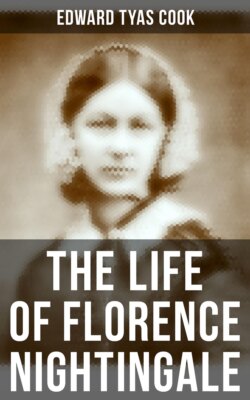Читать книгу The Life of Florence Nightingale - Edward Tyas Cook - Страница 52
На сайте Литреса книга снята с продажи.
III
ОглавлениеShe returned to Paris on May 30, and after a week spent with M. and Madame Mohl, during which she again inspected various hospitals, she entered the Maison de la Providence in the Rue Oudinot on June 8. From Paris she kept up correspondence with regard to the new premises for the institution in London. “The indispensable conditions of a suitable house are,” she wrote to Lady Canning (June 5), “first, that the nurse should never be obliged to quit her floor, except for her own dinner and supper, and her patients' dinner and supper (and even the latter might be avoided by the windlass we have talked about). Without a system of this kind, the nurse is converted into a pair of legs. Secondly, That the bells of the patients should all ring in the passage outside the nurse's own door on that story, and should have a valve which flies open when its bell rings, and remains open in order that the nurse may see who has rung.” The letter continues for some pages to describe other requirements—about a hot-water supply and the like; points which are now in the A B C of hospitals or nursing-homes, but which then were novel counsels of perfection. The idea of a lift, in particular, was new; inquiries were made by the ladies in various parts of the country, and there were many hitches before a suitable apparatus was installed. The correspondence is significant of the attention to practical detail which characterized all Miss Nightingale's work. Meanwhile her work with the Sisters of Charity among the poor came to a tiresome pause. The nurse had herself to be nursed. The nature of the calamity is described in a letter to Madame Mohl, who was paying visits in England at the time:—
Back Drawing-room at Madame Mohl's, Rue du Bac 120, June 28. My Dearest Friend—Do you see where I am? Here's a “go”! Has M. Mohl told you? Here am I in bed in your back drawing-room. Poor M. Mohl appears to bear it with wonderful equanimity and recueillement, like his danseuse. Not so I. It is the most impertinent, the most surprising, the most inopportune thing I have ever done—me established in a lady's house in her absence, to be ill. If M. Mohl had any sins, I should think I was the avenging Phooka appointed to castigate him—as he has none, I am obliged to arrest myself at the other supposition that it is for my own. It was not my fault though really. Here is how the things have happened. …
I have had the measles at the Sœurs. And, of all my adventures, of which I have had many and queer, as will be (never) recorded in the Book of my Wanderings, the dirtiest and the queerest I have ever had has been a measles in the cell of a Sœur de la Charité. They were very kind to me—and dear M. Mohl wrote to me almost every day, and sent me tea (which, however, they would not let me have), and he lastly, in his paternity, would have me back (where I came yesterday), and established me in the back drawing-room, to my infinite horror, and now I am getting better very fast, and mean to be out again in a day or two. I had got rid of the eruption and all that before I came. M. Mohl is so kind and comes to see me and talk, which I suppose is very improper, but I can't help it, and he has been like a father to me and never was such a father! I really am so ashamed of all his kindness, and the trouble I give them, that my brazen old face blushes crimson, and I assure you this paper ought to be red. Julie [the servant] is very kind to me. But I hope not to be long on their hands. As to my calamity itself, it is like the Mariage de Mademoiselle: who could have foreseen it? It really was not my fault. There was no measles at any of my posts, and I had had them not eighteen months ago, so that, erect in the consciousness of that dignity, I should not have kept out of their way, if I had seen them. The Dr. would not believe I could have had them before. Well, I'm so ashamed of myself that I shall lock myself up for the rest of my life, and never go nowhere no more. For you see, it's evident that Providence, who was always in my way, and who, as the Supérieure said, is très admirable (meaning wonderful) in having done this, does not mean me to come to Paris nor to the Sœurs, having twice made me ill when I was doing so—and given you all this trouble. For me to come to Paris to have the measles a second time, is like going to the Grand Desert to die of getting one's feet wet, or anything most unexpected. … Please write to M. Mohl, and comfort him for his disaster. I am so repentant that I can say nothing—which, the Catholics tell me, is the “marque” of a true “humiliation.” Thank you a thousand times for all your kindness. I come to England next week. F. N.
M. Mohl required no comfort. Miss Nightingale's father wrote to thank him for his kindness to her. The kindness, he gallantly replied, was on her side in giving him the advantage of her society and conversation. “Her gentle manner,” he wrote (July 25), “covers such a depth and strength of mind and thought, that I am afraid of nothing for her, but that her health should fail her.”
